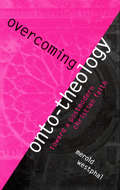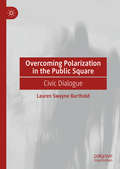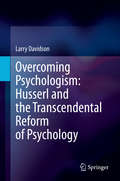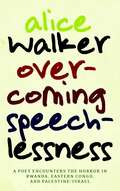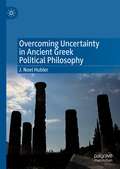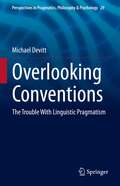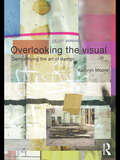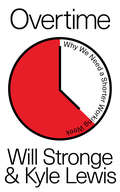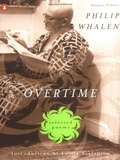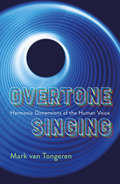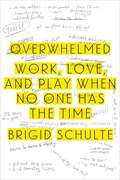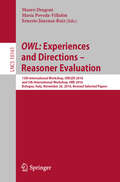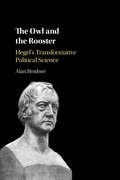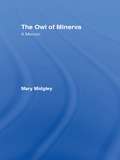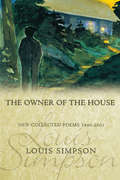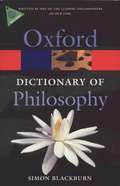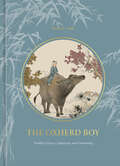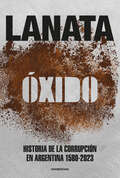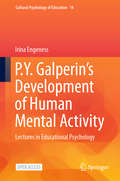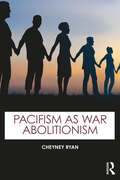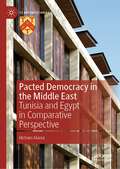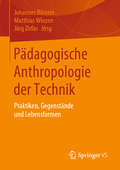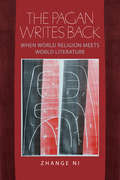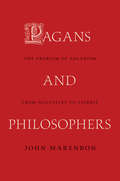- Table View
- List View
Overcoming Onto-Theology: Toward a Postmodern Christian Faith
by Merold WestphalOvercoming Onto-theology is a stunning collection of essays by Merold Westphal, one of America’s leading continental philosophers of religion, in which Westphal carefully explores the nature and the structure of a postmodern Christian philosophy. Written with characteristic clarity and charm, Westphal offers masterful studies of Heidegger’s early lectures on Paul and Augustine, the idea of hermeneutics, Schleiermacher, Hegel, Derrida, and Nietzsche, all in the service of building his argument that postmodern thinking offers an indispensable tool for rethinking Christian faith. A must read for every student and professor of continental philosophy and the philosophy of religion, Overcoming Onto-theology is an invaluable collection that brings together in one place fourteen provocative and lucid essays by one of the most important thinkers working in American philosophy today.
Overcoming Polarization in the Public Square: Civic Dialogue
by Lauren Swayne BartholdThis book describes how civic dialogue can serve as an antidote to a polarized public square. It argues that when pervasive polarization renders rational and fact-based argumentation ineffective, we first need to engage in a way that builds trust. Civic dialogue is a form of structured discourse that utilizes first-person narratives in order to promote trust, openness, and mutual understanding. By creating a dialogic structure that encourages listening and reflection, particularities and differences about fraught identities can be expressed in such a way that leads to the possibility of connecting through our fundamental, shared, and deeply felt humanity. Drawing on Plato, Buber, Gadamer, Dewey, cognitive bias research, as well as the work of dialogue practitioners, Lauren Swayne Barthold provides a sustained defense of civic dialogue as an effective strategy for avoiding futile political arguments and for creating pluralistic democratic communities.
Overcoming Psychologism: Husserl and the Transcendental Reform of Psychology
by Larry DavidsonThis book shows us how rather than abandoning psychology once he liberated phenomenology from the psychologism of the philosophy of arithmetic, Edmund Husserl remained concerned with the ways in which phenomenology held important implications for a radical reform of psychology throughout his intellectual career. The author fleshes out what such a radical reform actually entails, and proposes that it can only be accomplished by following the trail of the transcendental reduction described in Husserl’s later works. In order to appreciate the need for the transcendental even for psychology, the book tracks Husserl’s thinking on the nature of this relationship between phenomenology as a philosophy and psychology as a positive science as it evolved over time.The text covers Husserl’s definition of phenomenology as “descriptive psychology” in the Logical Investigations, rejecting the hybrid form of “phenomenological psychology” described in the lectures by that name, and ends with his proposal for a “fundamental refashioning” of psychology by situating it within the transcendental framework of The Crisis of European Sciences and Transcendental Phenomenology. The Author argues for a re-grounding of psychology by virtue of a “return to positivity” after having performed the reduction to transcendental intersubjectivity. What results is a phenomenological approach to a transcendentally-grounded psychology which, while having returned to the life-world, no longer remains transcendentally naïve. A phenomenologically-grounded psychology thus empowers researchers, clinicians, and clients alike to engage in social actions that move the world closer to achieving social justice for all. This text appeals to students and researchers working in phenomenology and psychology.
Overcoming Speechlessness: A Poet Encounters the Horror in Rwanda, Eastern Congo, and Palestine/Israel
by Alice WalkerIn 2006, Alice Walker, working with Women for Women International, visited Rwanda and the eastern Congo to witness the aftermath of the genocide in Kigali. Invited by Code Pink, an antiwar group working to end the Iraq War, Walker traveled to Palestine/Israel three years later to view the devastation on the Gaza Strip. Here is her testimony.Bearing witness to the depravity and cruelty, she presents the stories of the individuals who crossed her path and shared their tales of suffering and courage. Part of what has happened to human beings over the last century, she believes, is that we have been rendered speechless by unusually barbaric behavior that devalues human life. We have no words to describe what we witness. Self-imposed silence has slowed our response to the plight of those who most need us, often women and children, but also men of conscience who resist evil but are outnumbered by those around them who have fallen victim to a belief in weapons, male or ethnic dominance, and greed.
Overcoming Uncertainty in Ancient Greek Political Philosophy
by J. Noel HublerOvercoming Uncertainty in Ancient Greek Political Philosophy makes an historical and theoretical contribution by explaining the role of opinion in ancient Greek political philosophy, showing its importance for Aristotle’s theory of deliberation, and indicating a new model for a deliberative republic. Currently, there are no studies of opinion in ancient Greek political theory and so the book breaks new historical ground. The book establishes that opinion is key for the political theories of Plato, Aristotle, and the Stoics because each sees uncertainty as a problem that needs to be overcome if one is to establish a virtuous polity. Since they have different notions of the nature of the uncertainty of opinion, they develop very different political strategies to overcome it. The book explains that Plato’s and the Stoics’ analyses of uncertainty support oligarchy and monarchy, respectively, and that theoretical support for deliberate politics requires a more nuanced understanding of uncertainty that only Aristotle provides.
Overlooking Conventions: The Trouble With Linguistic Pragmatism (Perspectives in Pragmatics, Philosophy & Psychology #29)
by Michael DevittThis book criticizes the methodology of the recent semantics-pragmatics debate in the theory of language and proposes an alternative. It applies this methodology to argue for a traditional view against a group of “contextualists” and “pragmatists”, including Sperber and Wilson, Bach, Carston, Recanati, Neale, and many others. The author disagrees with these theorists who hold that the meaning of the sentence in an utterance never, or hardly ever, yields its literal truth-conditional content, even after disambiguation and reference fixing; it needs to be pragmatically supplemented in context.The standard methodology of this debate is to consult intuitions. The book argues that theories should be tested against linguistic usage. Theoretical distinctions, however intuitive, need to be scientifically motivated. Also we should not be guided by Grice’s “Modified Occam’s Razor”, Ruhl’s “Monosemantic Bias”, or other such strategies for “meaning denialism”. From this novel perspective, the striking examples of context relativity that motivate contextualists and pragmatists typically exemplify semantic rather than pragmatic properties. In particular, polysemous phenomena should typically be treated as semantic ambiguity. The author argues that conventions have been overlooked, that there’s no extensive “semantic underdetermination” and that the new theoretical framework of “truth-conditional pragmatics” is a mistake.
Overlooking the Visual: Demystifying the Art of Design
by Kathryn MooreMaking tangible connections between theory and practice, ideas and form, this book encourages debate about the artistic, conceptual, and cultural significance of the way things look. What are the metaphysical concepts at the heart of design education, theory, and philosophy? Why do we assume that design is impossible to teach? This book challenges the traditional foundations of perception and takes an imaginative, radical approach, setting itself apart from the traditions of analytical philosophy, evolutionary psychology, and phenomenology which underpin much of current design theory and discourse. The new definition of perception produces startling consequences for conceptions of language, intelligence, meaning, the senses, emotions and subjectivity. This is an innovative, fresh view on design and how we can improve it for both practitioners and students in the architecture and design fields as well as philosophers.
Overtime: Why We Need A Shorter Working Week
by Will Stronge Kyle LewisWork isn&’t workingAs precarity and low pay become further embedded in the job market, at a time when work-related stress and exhaustion are endemic, it is clear that a new, radical approach to employment is required. Many industries already face existential threats from automation, climate breakdown, a crisis of care, and an ageing population. In Overtime, Kyle Lewis and Will Stronge identify a powerful and practicable response to these worrying trends: the shorter working week.This urgent and timely book shows what a shorter working week means in the context of capitalist economies and delves into the history of this idea as well as its political implications. Drawing on a range of political and economic thinkers, Lewis and Stronge argue that a shorter working week could build a more just and equitable society, one based on collective freedom and human potential, providing scope for the many to achieve a happier, more fulfilling life.
Overtime: Selected Poems (Penguin Poets)
by Philip WhalenLike his college roommate Gary Snyder, Philip Whalen took both poetry and Zen seriously. He became friends with Allen Ginsberg, Jack Kerouac, and Michael McClure, and played a key role in the explosive poetic revolution of the '50s and '60s. Celebrated for his wisdom and good humor, Whalen transformed the poem for a generation. His writing, taken as a whole, forms a monumental stream of consciousness (or, as Whalen calls it, "continuous nerve movie") of a wild, deeply read, and fiercely independent American-one who refuses to belong, who celebrates and glorifies the small beauties to be found everywhere he looks. This long-awaited Selected Poems is a welcome opportunity to hear his influential voice again.
Overtone Singing: Harmonic Dimensions of the Human Voice
by Mark Van TongerenAn indispensable guide to a deeper understanding of the nature of the human voice and its harmonic possibilities from East to West.Overtone Singing is the most comprehensive book ever written on the hidden harmonies of the human voice. Ethnomusicologist and vocalist Mark van Tongeren offers fascinating insights into the timeless and universal aspects of sound and vibration. Grounded in the author&’s decade-long study of Asian music, the book draws upon field work, interviews with Eastern and Western musicians, and copious scholarship to present a multidisciplinary vision of sound that runs from global music to the science of acoustics and perception, onward to the philosophical and spiritual dimensions of music. Written in a nontechnical style, this generously illustrated book is an indispensable guide for musicians, listeners, and performers seeking a deeper understanding of the nature of the human voice and its harmonic possibilities from East to West.
Overwhelmed: Work, Love, and Play When No One Has the Time
by Brigid SchulteAccording to the Leisure Studies Department at the University of Iowa, true leisure is “that place in which we realize our humanity.” If that’s true, argues Brigid Schulte, then we're doing dangerously little realizing of our humanity. In Overwhelmed, Schulte, a staff writer for The Washington Post, asks: Are our brains, our partners, our culture, and our bosses making it impossible for us to experience anything but “contaminated time”?<P> Schulte first asked this question in a 2010 feature for The Washington Post Magazine: “How did researchers compile this statistic that said we were rolling in leisure—over four hours a day? Did any of us feel that we actually had downtime? Was there anything useful in their research—anything we could do?”<P> Overwhelmed is a map of the stresses that have ripped our leisure to shreds, and a look at how to put the pieces back together. Schulte speaks to neuroscientists, sociologists, and hundreds of working parents to tease out the factors contributing to our collective sense of being overwhelmed, seeking insights, answers, and inspiration. She investigates progressive offices trying to invent a new kind of workplace; she travels across Europe to get a sense of how other countries accommodate working parents; she finds younger couples who claim to have figured out an ideal division of chores, childcare, and meaningful paid work. Overwhelmed is the story of what she found out.
OWL: Experiences and Directions – Reasoner Evaluation
by Mauro Dragoni María Poveda-Villalón Ernesto Jimenez-RuizThis book constitutes the thoroughly refereed conference proceedings of the 13International Workshop on OWL: Experiences and Directions, OWLED 2016, and the 5th International Workshop on OWL: Reasoner Evaluation, ORE 2016, held in Bologna, Italy in November 20, 2016. The Workshops were co-located with the 20th International Conference on Knowledge Engineering and Knowledge Management, EKAW 2016. The 11 revised full papers, 3 short paper and one invited talk presented were carefully reviewed and selected from 27 initial submissions. The papers are trying to bridge the gap between ontology engineering practices and software engineering with the aim of describing reuse methods employed throughout the ontology development cyc≤ modeling/terminological decisions, alignment and comparison between ontologies, how ontologies are stored, versioned, distributed and consumed over the Web.
OWL: 13th International Workshop, OWLED 2016, and 5th International Workshop, ORE 2016, Bologna, Italy, November 20, 2016, Revised Selected Papers (Lecture Notes in Computer Science #10161)
by Mauro Dragoni María Poveda-Villalón Ernesto Jimenez-RuizThis book constitutes the thoroughly refereed conference proceedings of the 13International Workshop on OWL: Experiences and Directions, OWLED 2016, and the 5th International Workshop on OWL: Reasoner Evaluation, ORE 2016, held in Bologna, Italy in November 20, 2016. The Workshops were co-located with the 20th International Conference on Knowledge Engineering and Knowledge Management, EKAW 2016. The 11 revised full papers, 3 short paper and one invited talk presented were carefully reviewed and selected from 27 initial submissions. The papers are trying to bridge the gap between ontology engineering practices and software engineering with the aim of describing reuse methods employed throughout the ontology development cycle; modeling/terminological decisions, alignment and comparison between ontologies, how ontologies are stored, versioned, distributed and consumed over the Web.
The Owl and the Rooster: Hegel's Transformative Political Science
by Alan BrudnerSince 1945, there have been two waves of Anglo-American writing on Hegel's political thought. The first defended it against works portraying Hegel as an apologist of Prussian reaction and a theorist of totalitarian nationalism. The second presented Hegel as a civic humanist critic of liberalism in the tradition of Rousseau. The first suppressed elements of Hegel's thought that challenge liberalism's individualistic premises; the second downplayed Hegel's theism. This book recovers what was lost in each wave. It restores aspects of Hegel's political thought unsettling to liberal beliefs, yet that lead to a state more liberal than Locke's and Kant's, which retain authoritarian elements. It also scrutinizes Hegel's claim to have justified theism to rational insight, hence to have made it conformable to Enlightenment standards of admissible public discourse. And it seeks to show how, for Hegel, the wholeness unique to divinity is realizable among humans without concession or compromise and what role philosophy must play in its final achievement. Lastly, we are shown what form Hegel's philosophy can take in a world not yet prepared for his science. Here is Hegel's political thought undistorted.
Owl of Minerva: A Memoir
by Mary MidgleyOne of the UK's foremost moral philosophers, Mary Midgley recounts her remarkable story in this elegiac and moving account of friendships found and lost, bitter philosophical battles and of a profound love of teaching. In spite of her many books and public profile, little is known about Mary's life. Part of a famous generation of women philosophers that includes Elizabeth Anscombe, Philippa Foot, Mary Warnock and Iris Murdoch, Midgley tells us in vivid and humorous fashion how they cut a swathe through the arid landscape of 1950s British Philosophy, writing and arguing about the grand themes of character, beauty and the meaning of rudeness. As the mother of three children, her journey during the 1950s and 1960s was one of a woman fighting to combine a professional career with raising a family. In startling contrast to many of the academic stars of her generation, we learn that Midgley nearly became a novelist and started writing philosophy only when in her fifties, suggesting that Minerva’s owl really does fly at dusk. Charting the highs and lows of philosophy and academia in Britain, this publication sheds light on Mary’s close friends, her moral philosophy and her meetings with major philosophers, including Wittgenstein and Isaiah Berlin.
The Owner of the House: New Collected Poems 1940-2001 (American Poets Continuum)
by Louis SimpsonFew poets have so artfully confronted American life as Louis Simpson. Persona speakers struggle with everyday issues against a backdrop of larger forces, the individual&’s maladjustment to a culture of materialism and brutal competition, the failure of marriage under the pressures of such a society, the failure of the American dream. Simpson wages a lover&’s quarrel with the world."Louis Simpson has perfect pitch. His poems win us first by their drama, their ways of voicing our ways . . . of making do with our lives. Then his intelligence cajoles us to the brink of a cliff of solitude and we step over into the buoyant element of true poetry."—Seamus HeaneyEducated at Munro College (West Indies) and at Columbia University, Louis Simpson has taught widely, most recently at the State University of New York at Stony Brook. He is the author of seventeen books of poetry and ten works of prose. He has received fellowships from the Academy of American Poetry, the Hudson Review, the Guggenheim Foundation, and received the Pulitzer Prize for Poetry.
The Oxford Dictionary of Philosophy (2nd edition revised)
by Simon BlackburnPhilosophy is human thought become self-conscious. Its topics are life, the universe, and everything; it can include all the categories of religious, artistic, scientific, mathematical, and logical thought. This dictionary of philosophy is a record of some of the terms that excite such reflection, and some that have been found helpful in conducting it.
The Oxherd Boy: Parables of Love, Compassion, and Community
by Regina LinkeInspired by thousands of years of Chinese thought, an enchanting and heart-opening illustrated fable about a young boy who explores the many ways to make meaning and find joy in the everyday.Sometimes you can only do a small, small thing. And that can make all the difference.In this exquisitely illustrated parable grounded in the three pillars of Chinese philosophy, a young boy, his family ox, and a rabbit living in his garden help each other navigate the daily work of love, compassion, and community. Examining the world through the lenses of Taoism, Buddhism, and Confucianism, their conversations convey tender, uplifting messages for life's various crossroads.As they adopt a sparrow, bathe in rivers, comfort their neighbors, and tend to their chores, the characters&’ different perspectives are reflected in their conversations: the boy&’s Taoist love of nature and all it entails, the ox&’s Buddhist compassion for others, and the rabbit&’s Confucian practice of mutual respect and care. While they don't always agree, the friends settle on the basic truth that purpose comes from simply engaging with life—and with each other.Painted in a contemporary gongbi style, one of the oldest continuous art forms in the world, the atmospheric illustrations from Taiwanese American artist Regina Linke conjure a timeless, mystical land where the friends have made their home. The potent combination of magnificent art and gentle revelations will capture the hearts of readers, whatever their age.
Óxido: Historia de la corrupción en Argentina 1580-2023
by Jorge LanataUna investigación integral, histórica y periodística de la corrupción argentina a través de cinco siglos: del Virreinato al Olivosgate, Jorge Lanata recorre este proceso imparable de descomposición nacional y lo ilumina a través de una selección sorprendente de casos tanto poco conocidos como notables. Argentina está oxidada. La corrupción es su óxido. Y se extiende cada vez más sobre el país. Creemos verlo, creemos que está a la vista de todos. Pero, según los últimos estudios, solo el 12% de los hechos de corrupción conocidos llegan a la Justicia y solo el 2% recibe algún tipo de condena. Con el correr de los años, la corrupción ha ido cambiando, expandiéndose, perfeccionándose, poniéndose al abrigo de la impunidad. Aunque algo se mantuvo invariable: el rol del Estado. El inventor de la barrera siempre cobró peaje. En esta investigación histórica y periodística, Jorge Lanata recorre este proceso imparable de descomposición nacional y lo ilumina a través de una selección sorprendente de casos tanto poco conocidos como notables, que arrancan cuando Argentina no era todavía una república y llegan hasta hoy, cuando se pregunta si puede volver a serlo. Una radiografía descarnada para contar un país que -de forma deliberada, por omisión o negligencia- ha construido un sistema funcional al fraude, la malversación, la usurpación, el tráfico de influencias y el robo liso y llano. Un sistema en el que es casi imposible investigar y cuando se investiga, no se sanciona. En el que nunca hay funcionarios inocentes ni culpables, sino tan solo sospechosos. Una herrumbre que nos corroe desde siempre y se expande frente a nuestros ojos.
P.Y. Galperin's Development of Human Mental Activity: Lectures in Educational Psychology (Cultural Psychology of Education #14)
by Irina EngenessThis open access book introduces the legacy of Piotr Galperin to a wider audience of researchers, educators and psychologists. Previous translations of Galperin’s work present only some aspects of his conceptual thinking; however, his main contribution to the general, genetic and pedagogical psychology as a unique holistic and systemic approach to studying of psychological phenomena and processes, mechanisms of their formation and development, is still quite unknown in most parts of the world.The eight lectures chosen for the book have been translated from Russian for the first time, and they belong to the Study of the Formation of Human Mental Activity from Galperin’s collection of the Lectures in Psychology (Galperin, 2002). These eight lectures present the central ideas of Galperin’s pedagogical theory, and they conceptualise learning to learn approach and argue how teaching and learning process can enhance the development of higher mental functions with learners and therefore enhance the development of students as learners. These ideas may be of primary importance to educational practitioners and researchers interested in developmental learning and teaching approach given the current concerns of educational practice that schools struggle to prepare students for their adult and the need to develop the capacity in lifelong learning with students in the 21st century.
Pacifism as War Abolitionism
by Cheyney RyanResponding to the unprecedented violence of our times, and the corresponding interest in nonviolent solutions, this book takes up the heart of pacifism: its critique of what pacifists have termed the war system.Pacifism as War Abolitionism provides an account of the war system that draws on contemporary sociology, history, and political philosophy. The core of its critique of that system is that war begets war, and hence war will not be ended—or even constrained—by finding more principled ways to fight war, as many imagine. War can only be ended by ending the war system, which can only be done nonviolently. This has been the message of pacifism's great voices like Gandhi, Dr. Martin Luther King, Jr., and Dorothy Day. It is the principal message of this book.Key Features Draws extensively on the sociological and historical research on war to expand the usual philosophical discussion beyond hypothetical accounts Expands the dialogues on the ethics of war beyond just war theory to its principal alternative: pacifism Engages discussion of empire and imperialism in relation to the logic and development of the war system Presents pacifism’s response to the reality of war today, including the idea of "never-ending war"
Pacted Democracy in the Middle East: Tunisia and Egypt in Comparative Perspective (St Antony's Series)
by Hicham AlaouiThis book provides a new theory for how democracy can materialize in the Middle East, and the broader Muslim world. It shows that one pathway to democratization lays not in resolving important, but often irreconcilable, debates about the role of religion in politics. Rather, it requires that Islamists and their secular opponents focus on the concerns of pragmatic survival—that is, compromise through pacting, rather than battling through difficult philosophical issues about faith. This is the only book-length treatment of this topic, and one that aims to redefine the boundaries of an urgent problem that continues to haunt struggles for democracy in the aftermath of the Arab Spring.
Pädagogische Anthropologie der Technik: Praktiken, Gegenstände und Lebensformen
by Johannes Bilstein Matthias Winzen Jörg ZirfasDer Band geht der Frage nach, welche spezifisch edukativen Techniken angesichts der zunehmenden Etablierung und Professionalisierung der pädagogischen Arbeitsfelder erforderlich werden. In diesem Zusammenhang wird zu klären versucht, welche pädagogische und didaktische Vorbereitung auf eine zunehmend technisch orientierte Welt erfolgen muss. Zudem werden die alltäglichen Techniken der Selbstsorge analysiert. Und schließlich geht es in einer Pädagogischen Anthropologie auch um die Frage, wer Subjekt und Objekt der Technik ist.
The Pagan Writes Back: When World Religion Meets World Literature (Studies in Religion and Culture)
by Zhange NiIn the first book to consider the study of world religion and world literature in concert, Zhange Ni proposes a new reading strategy that she calls "pagan criticism," which she applies not only to late twentieth- and early twenty-first-century literary texts that engage the global resurgence of religion but also to the very concepts of religion and the secular. Focusing on two North American writers (the Jewish American Cynthia Ozick and the Canadian Margaret Atwood) and two East Asian writers (the Japanese Endō Shūsaku and the Chinese Gao Xingjian), Ni reads their fiction, drama, and prose to envision a "pagan (re)turn" in the study of world religion and world literature. In doing so, she highlights the historical complexities and contingencies in literary texts and challenges both Christian and secularist assumptions regarding aesthetics and hermeneutics. In assessing the collision of religion and literature, Ni argues that the clash has been not so much between monotheistic orthodoxies and the sanctification of literature as between the modern Western model of religion and the secular and its non-Western others. When East and West converge under the rubric of paganism, she argues, the study of religion and literature develops into that of world religion and world literature.
Pagans and Philosophers
by John MarenbonFrom the turn of the fifth century to the beginning of the eighteenth, Christian writers were fascinated and troubled by the "Problem of Paganism," which this book identifies and examines for the first time. How could the wisdom and virtue of the great thinkers of antiquity be reconciled with the fact that they were pagans and, many thought, damned? Related questions were raised by encounters with contemporary pagans in northern Europe, Mongolia, and, later, America and China. Pagans and Philosophers explores how writers--philosophers and theologians, but also poets such as Dante, Chaucer, and Langland, and travelers such as Las Casas and Ricci--tackled the Problem of Paganism. Augustine and Boethius set its terms, while Peter Abelard and John of Salisbury were important early advocates of pagan wisdom and virtue. University theologians such as Aquinas, Scotus, Ockham, and Bradwardine, and later thinkers such as Ficino, Valla, More, Bayle, and Leibniz, explored the difficulty in depth. Meanwhile, Albert the Great inspired Boethius of Dacia and others to create a relativist conception of scientific knowledge that allowed Christian teachers to remain faithful Aristotelians. At the same time, early anthropologists such as John of Piano Carpini, John Mandeville, and Montaigne developed other sorts of relativism in response to the issue. A sweeping and original account of an important but neglected chapter in Western intellectual history, Pagans and Philosophers provides a new perspective on nothing less than the entire period between the classical and the modern world.
